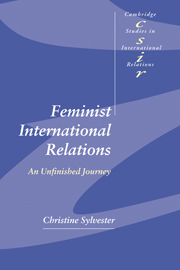Book contents
- Frontmatter
- Contents
- Acknowledgments
- Part I Introduction
- Part II Sightings
- Part III Sitings
- 8 The emperors' theories and transformations: looking at the field through feminist lenses
- 9 Feminists and realists view autonomy and obligation in international relations
- 10 Some dangers in merging feminist and peace projects
- 11 Gendered development imaginaries: shall we dance, Pygmalion?
- 12 Empathetic cooperation: a feminist method for IR
- Part IV Citings
- References
- Index
- CAMBRIDGE STUDIES IN INTERNATIONAL RELATIONS
9 - Feminists and realists view autonomy and obligation in international relations
Published online by Cambridge University Press: 22 September 2009
- Frontmatter
- Contents
- Acknowledgments
- Part I Introduction
- Part II Sightings
- Part III Sitings
- 8 The emperors' theories and transformations: looking at the field through feminist lenses
- 9 Feminists and realists view autonomy and obligation in international relations
- 10 Some dangers in merging feminist and peace projects
- 11 Gendered development imaginaries: shall we dance, Pygmalion?
- 12 Empathetic cooperation: a feminist method for IR
- Part IV Citings
- References
- Index
- CAMBRIDGE STUDIES IN INTERNATIONAL RELATIONS
Summary
I wrote the next essay for the major conference on Gender and International Relations that Ann Tickner conceived, won a Ford Foundation grant to fund, and hosted in 1990 with Peggy McIntosh at the Center for Research on Women of Wellesley College. Several layers of invited academics presented papers at this affair. Some were in what seemed then to be the fledgling feminist IR crowd (Tickner, Elshtain, Enloe, myself, Rebecca Grant, Spike Peterson, Robert Keohane, and Richard Ashley); they had participated in at least one of the two earlier conferences at the London School of Economics and Political Science (1988) and the University of Southern California (1989). In a second group were Ann Sisson Runyan, Mary Ann Tetreault, Craig Murphy, Carol Cohn, and R.B.J. Walker, who may not have been at earlier conferences but some or all of whose writings would later be identified with feminist IR. Then there were notables from IR, who contributed just that one time to the new endeavor: Hayward Alker, Mary Katzenstein, and Celeste Wallander. Several invited participants from outside IR also presented: Theda Skocpol, Beverley Grier, Mona Harrington, Joan Tronto, Ariti Rao, and Lois Wasserspring. That there were no representatives of British, European, or Australian IR at the conference – let alone from much of the world – did not strike most of us, I surmise, as strange.
- Type
- Chapter
- Information
- Feminist International RelationsAn Unfinished Journey, pp. 182 - 206Publisher: Cambridge University PressPrint publication year: 2001



